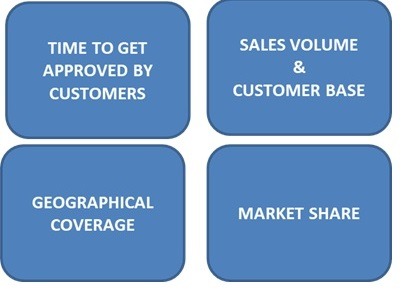
Grow your business through Sales Partners alliances
Growing your customer base is vital for any business but it is one of the most complicated things to do, especially in a distribution business: competition is fierce, selling prices are trending down while vendors’ prices are on the rise, and online marketing is reshaping the way to do business. There are two basic ways to win new customers: use your own sales force to approach and gain new customers, or develop strategic sales partners who are already positioned with the customers you want to win. In this article I will tell you all you need to know in order to consider exploring this alternative.
What are strategic sales partners?
A sales partners alliance is an agreement in which one company shares its customers with another business by selling or drawing attention to that company’s products, in exchange for a percentage of the sales. A business that has already taken the time to develop relationships with its customers has a huge marketing advantage over a newer or smaller company trying to acquire those same customers. By utilizing the goodwill that established customers have for the first business, a second business can benefit from that loyalty from an alliance.

Types of alliances vs sales goals
The type of sales partner you negotiate with is directly related to your sales and growth goals as an organization. The matrix below shows the benefits you can expect from a strategic sales alliance. Let’s consider each goal/benefit against the potential type of ally you should be looking for.
Time: Registering and getting products approved at large retailers is a time consuming-process. Getting an alliance with a company that already sells at those retailers we want to target greatly reduces the time it takes to have products approved at those retailers, under the umbrella of sales partners. Once your products sales shows good volume and frequency, transferring the products under your sales ID, within the retailers, is a lot easier. When choosing this strategy, you must keep in mind that the partner will keep a marginal percentage of the sales when you take over the sales.
Sales Volume & Customer base: If your company is new or small and you have limited resources, partnering with brokers and resellers is an excellent way to increase sales volume and your customer base.
Geographic coverage: One of the perks of doing business in the USA is the size of the country; that is why most companies start doing business within one state. If you want to expand to other states, designating sales channels for target states can be highly beneficial.
Market Share: For a new product to gain momentum and start to gain a piece of market share, it can be a long and costly process. It might include advertisement, TPS, Introductory prices and many other marketing tactics. Developing alliances with sales partners in any capacity (distributors, resellers, channels, etc.) will build the foundation of your product positioning.
How to build up a solid sales partnership?
Sales Partners have been one of the key strategies of our company for many years and one of the factors of our extraordinary growth. But a successful and long lasting sales alliance is only possible if both companies benefit from it. Think about it! Your potential partner is already selling in the channels you want to enter, and he has the trust of the client. Why would he bother to enter into an alliance with you? The only way he could consider it, is by having a tangible and significant benefit. I will illustrate this point by citing two of the sales partners we have developed.
Businesses that offer products that complement yours: We sell DSD and warehouse systems that integrate with ERP software and handheld devices. So, we structured a partnership program with ERP software companies where they simply suggest their customers call us if they need products like ours in exchange for a commission on their referrals’ sales and monthly fees. That was easy money! They did nothing outside of their business; it is just a simple suggestion that has resulted in a big additional stream of income for them.
Partial Competitors: We found that many of our large competitors were missing out on sales opportunities in the small business segment because their solution was too expensive and over dimensioned for the size of those businesses. So, we decided to structure a program where they could sell our solution as part of their own portfolio at no additional cost, but retaining a portion of the fees. The strategy worked so well that they ended up developing modules that integrated our solution with theirs.
In short: Successful alliances are just a matter of being clear about your sales growth, defining a sound strategy, a deep understanding of your market and a proactive imagination. You can have more details abut these models in the video at the end of the article.
I hope this article has been helpful to you. I will continue to post information related to warehouse management, distribution practices and trends, and the economy in general. If you are interested in this article or want to learn more about Laceup Solutions, please subscribe to stay updated on future articles.
There is a lot of relevant information on our channel. Check out this video about the experience on our sales partner.


Sorry, the comment form is closed at this time.